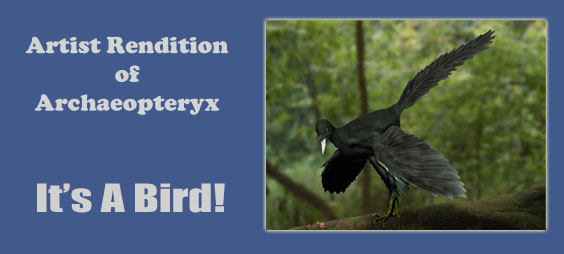Evolution should have produced billions of transitional fossils. With the many steps required to evolve from one kind of animal to another, we should be buried in transitional fossils. But, that's not the case. There are only handful or so, and most of those are disputed even within evolutionary circles. One of the most promoted transitional fossils, except among orthinologists (bird experts) who know it is a true bird, is archaeopteryx. So what is archaeoptryx? A transitional fossil? A bird? Or something else?
What Bird Features Does Archaeopteryx Have?
It obvious that archaeopteryx had feathers. Fully developed, true flight feathers that look just like modern flight feathers. In other words, bird feathers. And the wing and tail feathers are asymmetric, just like modern birds. In addition, birds have several types of feathers, and this is seen in archaeopertyx. It's feathers are differentiated into the various structures of modern feathers. Functionally archaeopteryx looks like a modern bird.
Archaeopteryx had perching feet, with the hallux pointing backwards, just like modern perching birds.
From the structure of the brain case we know that Archaeopteryx had a bird's brain (proportionally three times larger than a dinosaur brain) and inner ear. For example, the inner ear is designed to enhance auditory and spatial sensory perception, both of which are essential to flying birds.
Archaeopteryx's anatomy strongly indicates it was well adapted to flight and that it was arboreal, meaning that it spent a lot of time in trees and dense foliage.
In vertebrates, including theropod dinosaurs, only the lower jaw (mandible) moves. In birds, the upper jaw also moves, as is true of archaeopteryx.
Some dinosaurs and all birds have some pneumatized bones. But, archaeopertyx skeltons have a pneumatized vertabrae and pelvis. This design indicates that archaeopteryx had a bird's once-through breathing system.
These fundamental characteristics of birds provide strong evidence that archaeopteryx was a unique bird, but not a transitional form. In addition, those features claimed to be similar to structures in dinosaurs show no signs of evolution, but are fully formed and functional. They did what they were designed to do. The evidence has spoken. Archaeopteryx is a bird, possibly a mosaic bird, but a bird. It provides no evidence that supports the idea that birds evolved from dinosaurs. However, let's ask another question. Is it even possible for a dinosaur to evolve into a bird?
Next: Dino to Bird. Is It Even Possible?
Go Deeper: Microraptor


